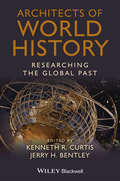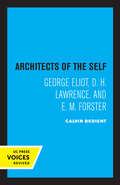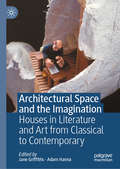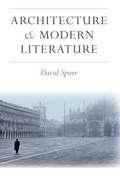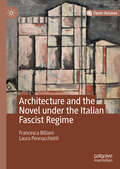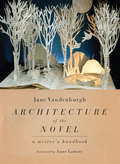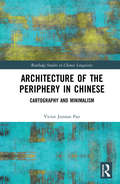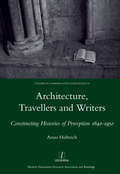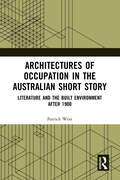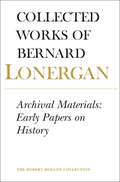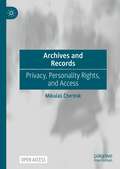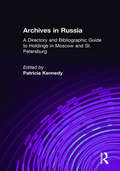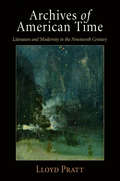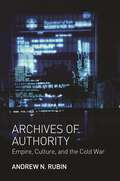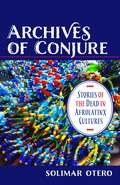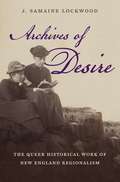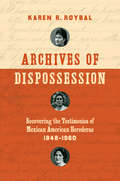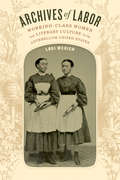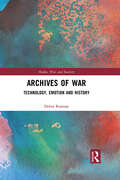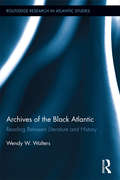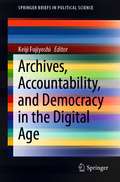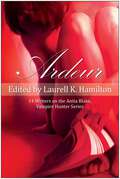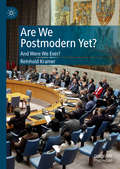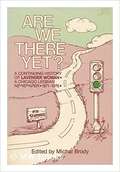- Table View
- List View
Architects of World History: Researching the Global Past
by Jerry H. Bentley Kenneth R. CurtisArchitects of World History presents an innovative collection of original essays by leading scholars associated with World History, exploring through intellectual autobiography the ideas, challenges, and inspirations that are shaping the field Features original, accessible contributions from pioneering scholars in the field Offers insights into the process of developing a workable world history research topic and the experience of professional life as a world historian. Points to methodological challenges; the scholar’s current research agenda in relation to the development of world history; and future directions anticipated for key areas within world history
Architects of the Self: George Eliot, D. H. Lawrence, and E. M. Forster
by Calvin BedientThis title is part of UC Press's Voices Revived program, which commemorates University of California Press’s mission to seek out and cultivate the brightest minds and give them voice, reach, and impact. Drawing on a backlist dating to 1893, Voices Revived makes high-quality, peer-reviewed scholarship accessible once again using print-on-demand technology. This title was originally published in 1972.
Architectural Space and the Imagination: Houses in Literature and Art from Classical to Contemporary
by Adam Hanna Jane GriffithsThis book sheds light on the intimate relationship between built space and the mind, exploring the ways in which architecture inhabits and shapes both the memory and the imagination. Examining the role of the house, a recurrent, even haunting, image in art and literature from classical times to the present day, it includes new work by both leading scholars and early career academics, providing fresh insights into the spiritual, social, and imaginative significances of built space. Further, it reveals how engagement with both real and imagined architectural structures has long been a way of understanding the intangible workings of the mind itself.
Architecture and Modern Literature
by David SpurrArchitecture and Modern Literature explores the representation and interpretation of architectural space in modern literature from the early nineteenth century to the present, with the aim of showing how literary production and architectural construction are related as cultural forms in the historical context of modernity. In addressing this subject, it also examines the larger questions of the relation between literature and architecture and the extent to which these two arts define one another in the social and philosophical contexts of modernity. Architecture and Modern Literature will serve as a foundational introduction to the emerging interdisciplinary study of architecture and literature. David Spurr addresses a broad range of material, including literary, critical, and philosophical works in English, French, and German, and proposes a new historical and theoretical overview of this area, in which modern forms of "meaning" in architecture and literature are related to the discourses of being, dwelling, and homelessness.
Architecture and the Novel under the Italian Fascist Regime
by Francesca Billiani Laura PennacchiettiArchitecture and the Novel under the Italian Fascist Regime discusses the relationship between the novel and architecture during the Fascist period in Italy (1922-1943). By looking at two profoundly diverse aesthetic phenomena within the context of the creation of a Fascist State art, Billiani and Pennacchietti argue that an effort of construction, or reconstruction, was the main driving force behind both projects: the advocated “revolution” of the novel form (realism) and that of architecture (rationalism). The book is divided into seven chapters, which in turn analyze the interconnections between the novel and architecture in theory and in practice. The first six chapters cover debates on State art, on the novel and on architecture, as well as their historical development and their unfolding in key journals of the period. The last chapter offers a detailed analysis of some important novels and buildings, which have in practice realized some of the key principles articulated in the theoretical disputes.
Architecture of the Novel: A Writer's Handbook
by Jane Vandenburgh Anne LamottJane Vandenburgh, the author of two highly acclaimed novels and a recent memoir, offers aspiring writers the tools to create powerful and unique novels filled not only with good writing but also dynamic storytelling.Architecture of the Novel is an ambitious blueprint for writers, one that reveals the underlying machinery that propels a plot that is dynamic, coherent, and interesting.Architecture of the Novel derives from the many years Vandenburgh has spent teaching the craft of fiction writing. Her method points to the elemental nature of narrative: A story consists of its events, which are told in scenes. These scenes naturally place themselves along the arc of the story in an order that provides suspense and mystery, drawing characters toward the inevitability of their fictive destinies.Profoundly practical yet encouraging to writers at all levels, Architecture of the Novel offers the maps and mechanics to successfully guide writers toward the story that must be told.
Architecture of the Periphery in Chinese: Cartography and Minimalism (Routledge Studies in Chinese Linguistics)
by Victor Junnan PanArchitecture of the Periphery in Chinese offers a comprehensive survey on the fine structure of the sentence peripheral domain in Mandarin Chinese from a cartographic perspective. Different functional projections hosting sentence-final particles, implicit operators and other informational components are hierarchically ordered according to the "Subjectivity Scale Constraint" functioning at syntax-discourse interface. Three questions will be essentially addressed: What is the order? How to determine such an order? Why such an order? This research not only gives a thorough examination of the peripheral elements in Chinese but also improves the general understanding of the ordering issue in the left-periphery crosslinguistically. This book is aimed at scholars interested in Chinese syntax or generative syntax.
Architecture, Travellers and Writers: Constructing Histories of Perception 1640-1950
by Anne HultzschDoes the way in which buildings are looked at, and made sense of, change over the course of time? How can we find out about this? By looking at a selection of travel writings spanning four centuries, Anne Hultzsch suggests that it is language, the description of architecture, which offers answers to such questions. The words authors use to transcribe what they see for the reader to re-imagine offer glimpses at modes of perception specific to one moment, place and person. Hultzsch constructs an intriguing patchwork of local and often fragmentary narratives discussing texts as diverse as the 17th-century diary of John Evelyn, Daniel Defoe's Robinson Crusoe (1719) and an 1855 art guide by Swiss art historian Jacob Burckhardt. Further authors considered include 17th-century collector John Bargrave, 18th-century novelist Tobias Smollett, poet Johann Wolfgang von Goethe, critic John Ruskin as well as the 20th-century architectural historian Nikolaus Pevsner. Anne Hultzsch teaches at the Bartlett School of Architecture, University College London.
Architectures of Occupation in the Australian Short Story: Literature and the Built Environment after 1900
by Patrick WestPatrick West’s Architectures of Occupation in the Australian Short Story cultivates the potential for literary representations of architectural space to contribute to the development of a contemporary politics of Australian post-colonialism.West argues that the predominance of tropes of place within cultural and critical expressions of Australian post-colonialism should be re-balanced through attention to spatial strategies of anti-colonial power. To elaborate the raw material of such strategies, West develops interdisciplinary close readings of keynote stories within three female-authored, pan-twentieth century, Australian short-story collections: Bush Studies by Barbara Baynton (1902); Kiss on the Lips and Other Stories by Katharine Susannah Prichard (1932); and White Turtle: A Collection of Short Stories by Merlinda Bobis (1999). The capacity of the short-story form to prompt creative and politically germinal engagements with species of space associated with architecture and buildings is underscored. Relatedly, West argues that the recent resurgence of binary thought—on local, national, and international scales—occasions an approach to the short-story collections shaped by binary relationships like a dichotomy of inside and outside. Concluding his argument, West connects the literary and architectural critiques of the story collections to the wicked problem, linked to ongoing colonial violences, of improving Australian Indigenous housing outcomes.Innovative and interdisciplinary, this book will be of interest to scholars and students of Literary, Architectural, and Postcolonial Studies. .
Archival Material: Early Papers on History, Volume 25 (Collected Works of Bernard Lonergan #25)
by Lonergan Research InstituteIn the mid- to late-1930s, while he was a student at the Gregorian University in Rome, Bernard Lonergan wrote a series of eight essays on the philosophy and theology of history. These essays foreshadow a number of the major themes in his life’s work. The significance of these essays is enormous, not only for an understanding of the later trajectory of Lonergan’s own work but also for the development of a contemporary systematic theology. In an important entry from 1965 in his archival papers, Lonergan wrote that the "mediated object" of systematics is Geschichte or the history that is lived and written about. In the same entry, he stated that the "doctrines" that this systematic theology would attempt to understand are focused on "redemption." The seeds of such a theology are planted in the current volume, where the formulae that are so pronounced in his later work first appear. Students of Lonergan’s work will find their understanding of his philosophy profoundly affected by the essays in this volume.
Archives and Records: Privacy, Personality Rights, and Access
by Mikuláš ČtvrtníkThis open access book addresses the protection of privacy and personality rights in public records, records management, historical sources, and archives; and historical and current access to them in a broad international comparative perspective. Considering the question “can archiving pose a security risk to the protection of sensitive data and human rights?”, it analyses data security and presents several significant cases of the misuse of sensitive personal data, such as census data or medical records. It examines archival inflation and the minimisation and reduction of data in public records and archives, including data anonymisation and pseudonymisation, and the risks of deanonymisation and reidentification of persons. The book looks at post-mortem privacy protection, the relationship of the right to know and the right to be forgotten and introduces a specific model of four categories of the right to be forgotten. In its conclusion, the book presents a set of recommendations for archives and records management.
Archives in Russia: A Directory and Bibliographic Guide to Holdings in Moscow and St.Petersburg
by Patricia Kennedy Grimsted Patricia Kennedy GrimsteadThis is a comprehensive directory and bibliographic guide to Russian archives and manuscript repositories in the capital cities of Moscow and St. Petersburg. It is an essential resource for any researcher interested in Russian sources for topics in diplomatic, military, and church history; art; dance; film; literature; science; ethnolography; and geography. The first part lists general bibliographies of relevant reference literature, directories, bibliographic works, and specialized subject-related sources. In the following sections of the directory, archival listings are grouped in institutional categories. Coverage includes federal, ministerial, agency, presidential, local, university, Academy of Sciences, organizational, library, and museum holdings. Individual entries include the name of the repository (in Russian and English), basic information on location, staffing, institutional history, holdings, access, and finding aids.More comprehensive and up-to-date than the 1997 Russian Version, this edition includes Web-site information, dozens of additional repositories, several hundred more bibliographical entries, coverage of reorganization issues, four indexes, and a glossary.
Archives of American Time
by Lloyd PrattAmerican historians have typically argued that a shared experience of time worked to bind the antebellum nation together. Trains, technology, and expanding market forces catapulted the United States into the future on a straight line of progressive time. The nation's exceedingly diverse population could cluster around this common temporality as one forward-looking people.In a bold revision of this narrative, Archives of American Time examines American literature's figures and forms to disclose the competing temporalities that in fact defined the antebellum period. Through discussions that link literature's essential qualities to social theories of modernity, Lloyd Pratt asserts that the competition between these varied temporalities forestalled the consolidation of national and racial identity. Paying close attention to the relationship between literary genre and theories of nationalism, race, and regionalism, Archives of American Time shows how the fine details of literary genres tell against the notion that they helped to create national, racial, or regional communities. Its chapters focus on images of invasive forms of print culture, the American historical romance, African American life writing, and Southwestern humor. Each in turn revises our sense of how these images and genres work in such a way as to reconnect them to a broad literary and social history of modernity. At precisely the moment when American authors began self-consciously to quest after a future in which national and racial identity would reign triumphant over all, their writing turned out to restructure time in a way that began foreclosing on that particular future.
Archives of Authority: Empire, Culture, and the Cold War (Translation/Transnation #32)
by Andrew N. RubinCombining literary, cultural, and political history, and based on extensive archival research, including previously unseen FBI and CIA documents, Archives of Authority argues that cultural politics--specifically America's often covert patronage of the arts--played a highly important role in the transfer of imperial authority from Britain to the United States during a critical period after World War II. Andrew Rubin argues that this transfer reshaped the postwar literary space and he shows how, during this time, new and efficient modes of cultural transmission, replication, and travel--such as radio and rapidly and globally circulated journals--completely transformed the position occupied by the postwar writer and the role of world literature. Rubin demonstrates that the nearly instantaneous translation of texts by George Orwell, Thomas Mann, W. H. Auden, Richard Wright, Mary McCarthy, and Albert Camus, among others, into interrelated journals that were sponsored by organizations such as the CIA's Congress for Cultural Freedom and circulated around the world effectively reshaped writers, critics, and intellectuals into easily recognizable, transnational figures. Their work formed a new canon of world literature that was celebrated in the United States and supposedly represented the best of contemporary thought, while less politically attractive authors were ignored or even demonized. This championing and demonizing of writers occurred in the name of anti-Communism--the new, transatlantic "civilizing mission" through which postwar cultural and literary authority emerged.
Archives of Conjure: Stories of the Dead in Afrolatinx Cultures (Gender, Theory, and Religion)
by Solimar OteroIn Afrolatinx religious practices such as Cuban Espiritismo, Puerto Rican Santería, and Brazilian Candomblé, the dead tell stories. Communicating with and through mediums’ bodies, they give advice, make requests, and propose future rituals, creating a living archive that is coproduced by the dead. In this book, Solimar Otero explores how Afrolatinx spirits guide collaborative spiritual-scholarly activist work through rituals and the creation of material culture. By examining spirit mediumship through a Caribbean cross-cultural poetics, she shows how divinities and ancestors serve as active agents in shaping the experiences of gender, sexuality, and race.Otero argues that what she calls archives of conjure are produced through residual transcriptions or reverberations of the stories of the dead whose archives are stitched, beaded, smoked, and washed into official and unofficial repositories. She investigates how sites like the ocean, rivers, and institutional archives create connected contexts for unlocking the spatial activation of residual transcriptions. Drawing on over ten years of archival research and fieldwork in Cuba, Otero centers the storytelling practices of Afrolatinx women and LGBTQ spiritual practitioners alongside Caribbean literature and performance. Archives of Conjure offers vital new perspectives on ephemerality, temporality, and material culture, unraveling undertheorized questions about how spirits shape communities of practice, ethnography, literature, and history and revealing the deeply connected nature of art, scholarship, and worship.
Archives of Desire
by J. Samaine LockwoodIn this thought-provoking study of nineteenth-century America, J. Samaine Lockwood offers an important new interpretation of the literary movement known as American regionalism. Lockwood argues that regionalism in New England was part of a widespread woman-dominated effort to rewrite history. Lockwood demonstrates that New England regionalism was an intellectual endeavor that overlapped with colonial revivalism and included fiction and history writing, antique collecting, colonial home restoration, and photography. The cohort of writers and artists leading this movement included Sarah Orne Jewett, Alice Morse Earle, and C. Alice Baker, and their project was taken up by women of a younger generation, such as Charlotte Perkins Gilman and Pauline Elizabeth Hopkins, who extended regionalism through the modernist moment. Lockwood draws on a diverse archive that includes fiction, material culture, collecting guides, and more. Showing how these women intellectuals aligned themselves with a powerful legacy of social and cultural dissent, Lockwood reveals that New England regionalism performed queer historical work, placing unmarried women and their myriad desires at the center of both regional and national history.
Archives of Dispossession: Recovering the Testimonios of Mexican American Herederas, 1848–1960 (Gender and American Culture)
by Karen R. RoybalOne method of American territory expansion in the U.S.-Mexico borderlands was the denial of property rights to Mexican landowners, which led to dispossession. Many historical accounts overlook this colonial impact on Indigenous and Mexican peoples, and existing studies that do tackle this subject tend to privilege the male experience. Here, Karen R. Roybal recenters the focus of dispossession on women, arguing that gender, sometimes more than race, dictated legal concepts of property ownership and individual autonomy. Drawing on a diverse source base—legal land records, personal letters, and literature—Roybal locates voices of Mexican American women in the Southwest to show how they fought against the erasure of their rights, both as women and as landowners. Woven throughout Roybal's analysis are these women's testimonios—their stories focusing on inheritance, property rights, and shifts in power. Roybal positions these testimonios as an alternate archive that illustrates the myriad ways in which multiple layers of dispossession—and the changes of property ownership in Mexican law—affected the formation of Mexicana identity.
Archives of Labor: Working-Class Women and Literary Culture in the Antebellum United States
by Lori MerishIn Archives of Labor, Lori Merish establishes working-class women as significant actors within literary culture, dramatically redrawing the map of nineteenth-century US literary and cultural history. Delving into previously unexplored archives of working-class women's literature—from autobiographies, pamphlet novels, and theatrical melodrama to seduction tales and labor periodicals—Merish recovers working-class women's vital presence as writers and readers in the antebellum era. Her reading of texts by a diverse collection of factory workers, seamstresses, domestic workers, and prostitutes boldly challenges the purportedly masculine character of class dissent during this era. Whether addressing portrayals of white New England "factory girls," fictional accounts of African American domestic workers, or the first-person narratives of Mexican women working in the missions of Mexican California, Merish unsettles the traditional association of whiteness with the working class to document forms of cross-racial class identification and solidarity. In so doing, she restores the tradition of working women's class protest and dissent, shows how race and gender are central to class identity, and traces the ways working women understood themselves and were understood as workers and class subjects.
Archives of War: Technology, Emotion and History (Media, War and Security)
by Debra RamsayThis book offers a comparative analysis of British Army Unit War Diaries in the two World Wars, to reveal the role played by previously unnoticed technologies in shaping the archival records of war. Despite thriving scholarship on the history of war, the history of Operational Record Keeping in the British Army remains unexplored. Since World War I, the British Army has maintained daily records of its operations. These records, Unit War Diaries, are the first official draft of events on the battlefield. They are vital for the army’s operational effectiveness and fundamental to the histories of British conflict, yet the material history of their own production and development has been widely ignored. This book is the first to consider Unit War Diaries as mediated, material artefacts with their own history. Through a unique comparative analysis of the Unit War Diaries of the First and Second World Wars, this book uncovers the mediated processes involved in the practice of operational reporting and reveals how hidden technologies and ideologies have shaped the official record of warfare. Tracking the records into The National Archives in Kew, where they are now held, the book interrogates how they are re-presented and re-interpreted through the archive. It investigates how the individuals, institutions and technologies involved in the production and uses of unit diaries from battlefield to archive have influenced how modern war is understood and, more importantly, waged. This book will be of much interest to students of media and communication studies, military history, archive studies and British history.
Archives of the Black Atlantic: Reading Between Literature and History
by Wendy W. WaltersMany African diasporic novelists and poets allude to or cite archival documents in their writings, foregrounding the elements of archival research and data in their literary texts, and revising the material remnants of the archive. This book reads black historical novels and poetry in an interdisciplinary context, to examine the multiple archives that have produced our historical consciousness. In the history of African diaspora literature, black writers and intellectuals have led the way for an analysis of the archive, querying dominant archives and revising the ways black people have been represented in the legal and hegemonic discourses of the west. Their work in genres as diverse as autobiography, essay, bibliography, poetry, and the novel attests to the centrality of this critique in black intellectual culture. Through literary engagement with the archives of the slave trader, colonizer, and courtroom, creative writers teach us to read the archives of history anew, probing between the documents for stories left untold, questions left unanswered, and freedoms enacted against all odds. Opening new perspectives on Atlantic history and culture, Walters generates a dialogue between what was and what might have been. Ultimately, Walters argues that references to archival documents in black historical literature introduce a new methodology for studying both the archive and literature itself, engaging in a transnational and interdisciplinary reading that exposes the instability of the archive's truth claim and highlights rebellious possibility.
Archives, Accountability, and Democracy in the Digital Age (SpringerBriefs in Political Science)
by Keiji FujiyoshiThis book is the first attempt to introduce the current status of archival practices in Japan as well as the basic views of the populace on making records accessible to English readers. In general, Japan has not paid sufficient attention to keeping and utilizing records except in the field of historical research. This book thus examines Japanese attitudes about history, records management, information acts, the status of archivists of the constitution, and genealogical research practices and a description of archives. Consequently, such investigations clarify how both private and public archives function or fail to do so in those spheres of Japanese society. In addition, this book presents the efforts in wartime record keeping in Australia, which is significantly different from how the Japanese deal with such records. This book therefore provides a clear and concrete picture of the status of current archival practices in Japan and the thinking that underlies them. On the basis of such examinations, this book enables readers to understand to what extent and how the past affects the present through archives, to recognize the importance of archives, and to respect the past in order to maintain and develop perspectives in people’s lives.
Ardeur: 14 Writers on the Anita Blake, Vampire Hunter Series
by Laurell K. HamiltonLaurell K. Hamilton's Anita Blake, Vampire Hunter series is a literary sensation, thanks to its strong female hero, well-fleshed (both literally and literarily) characters and unabashed attitude toward sex. The world Hamilton has created is powerfully compelling and stunningly complex—and it gets deeper, richer and more perilous, with every book. Straddling the series' dominant themes of sex and power, Ardeur gives Anita fans a deeper look into the dynamics, both personal political, that have kept readers fascinated throughout the run of the series. Why is the ardeur the very best thing that could have happened to Anita, personally (aside from all the sex it requires her to have with hot men)? How is Anita's alternate United States a logical legal extension of our own? And as the series continues, what other bargains might Anita have to make with herself and others in order to keep the people she loves safe from harm? The collection includes essay introductions by Hamilton, giving context and extra insight into each essay's subject.
Arduous Tasks
by Lina N InsanaOne of twentieth-century Italy's greatest thinkers, Primo Levi (1919-1987) started reflecting on the Holocaust almost immediately after his return home from the year he survived in Auschwitz. Levi's powerful Holocaust testimonials reveal his preoccupation with processes of translation, in the form of both embedded and book-length renderings of texts relevant to Holocaust survival. In Arduous Tasks, Lina N. Insana demonstrates how translation functions as a metaphor for the transmission of Holocaust testimony and broadens the parameters of survivor testimony. The first book to study Levi and translation, Arduous Tasks overcomes the conventional views of the separation between his own personal memoirs and his translations by stressing the centrality of translation in Levi's entire corpus. Examining not only the testimonial nature of his work, Insana also discusses the transgressive and performative aspects of transmission in his writings. Arduous Tasks is a superb and innovative study on the importance of translation not only to Levi, but also to Holocaust studies in general.
Are We Postmodern Yet?: And Were We Ever?
by Reinhold KramerIn this book, Reinhold Kramer explores a variety of important social changes, including the resistance to objective measures of truth, the rise of “How-I-Feel” ethics, the ascendancy of individualism, the immersion in cyber-simulations, the push toward globalization and multilateralism, and the decline of political and religious faiths. He argues that the displacement, since the 1990s, of grand narratives by ego-based narratives and small narratives has proven inadequate, and that selective adherence, pluralist adaptation, and humanism are more worthy replacements. Relying on evolutionary psychology as much as on Charles Taylor, Kramer argues that no single answer is possible to the book title’s question, but that the term “postmodernity” – referring to the era, not to postmodernism – still usefully describes major currents within the contemporary world.
Are We There Yet?: A Continuing History Of Lavender Woman: A Chicago Lesbian Newpaper 1971-1976
by Michal BrodySerious yet entertaining history of an exciting lesbian era. Thought-provoking analysis and lively description.
